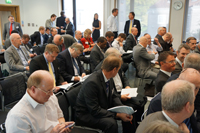|
Though no medals were awarded for communications performance, the safe and efficient running of the London 2012 Olympic and Paralympic Games has won these events worldwide recognition as a model of their kind. Much of the communications load generated by the 2012 games was shouldered by Airwave, which operates the nationwide TETRA-based network for Britain’s public safety services. But details of some of the other contributions emerged at a meeting entitled Securing the Summer of Sport – an event organized by the Wireless Security and Defence special interest group (SIG) of Cambridge Wireless in partnership with the ICT KTN (Knowledge Transfer Network), an innovation agency sponsored by the UK Government. First speaker of the afternoon was Dean Checkley, head of service for Airwave, who provided some further insights into his company’s activity as a critical player in the summer’s events. These included constructing a dedicated TETRA radio network known as Apollo to support the organizers of the games – a project necessary for regulatory reasons, to separate games traffic from the often sensitive information carried by the existing Airwave ‘blue light’ network. “Not only was Airwave involved in the Olympics and Paralympics, we were also involved in the Queen’s Jubilee weekend”, Mr Checkley said. “We were also involved in the Notting Hill Carnival this year and we were also involved in the Heroes’ Parade as well. So, for Airwave, we had a very long, sustained period of special events, without allowing the business-as-usual to drop off.” Backed by a managed service for end users, among whom were an army of volunteer helpers assembled by LOCOG (the London Organising Committee of the Olympic and Paralympic Games), the Apollo network covered all competition venues and also some of the reserved Olympic road routes in London, plus other locations such as ‘gold’ and ‘silver’ command centres. “We actually delivered about 48 000 separate pieces of equipment to the end users”, Mr Checkley said. “That ranged from radio handsets to earpieces to batteries, to battery chargers.” Extended radio coverage had to be supplied for the road cycling events, from central London out to the Surrey hills, so that a rolling sequence of road closures could be safely executed. In addition, radio support was needed for the passage of the Olympic and the Paralympic torch relays. “We had to create almost a moving ball of service to make sure that the torch relay was safe and secure”, Mr Checkley said. “What we also did was we increased the capacity of the ‘blue light’ network in and around the venue areas, to make sure that all the additional officers that were coming to support the Games managed to keep their service going, and we saw over two million point-to-point calls on one particular day, on that particular network.” Getting busyAirwave provided TETRA radios to some 18 000 Olympic volunteers, most of whom had not previously used a professional radio. “So if you do get a ‘busy’ on a radio, don’t keep trying to reconnect”, Mr Checkley and his team advised them. “That saps the capacity of the network. So what we had to do was also to install some tools on to the network that drove correct behaviour – ‘valid site profiles’. It allowed us to control the capacity of the network in any particular venue, to ensure that all the people got access to airtime that they needed.” Technical problems during the games included a few troublesome cases of interference, several of them in Hyde Park, in central London. Among the sources of interference were a wireless public address system (tracked down in collaboration with engineers from Ofcom, the UK spectrum regulator), a lift motor in a nearby hotel, and (a difficult one to trace) the buggies used to move people and equipment around the park. Summing up the experience, Mr Checkley said: “It’s not just about the Games, it’s the whole life-cycle, right from the start... Anticipate everything, right through to decommissioning and closing down. “Capturing real user experiences is really vital”, he added. “We had people out there walking the streets, talking to the people who were actually using the radios and getting their feedback, and helping them through some of the issues that they were experiencing. Really, really vital. “And don’t underestimate the passion of your people, because actually people do extraordinary things when they are truly dedicated to providing a service to the end user.”
|

 Key personalities involved in radiocommunications during London’s successful Olympic summer shared their experience and reflections at a recent forum in Cambridge, England. Richard Lambley reports on the main topics covered.
Key personalities involved in radiocommunications during London’s successful Olympic summer shared their experience and reflections at a recent forum in Cambridge, England. Richard Lambley reports on the main topics covered.